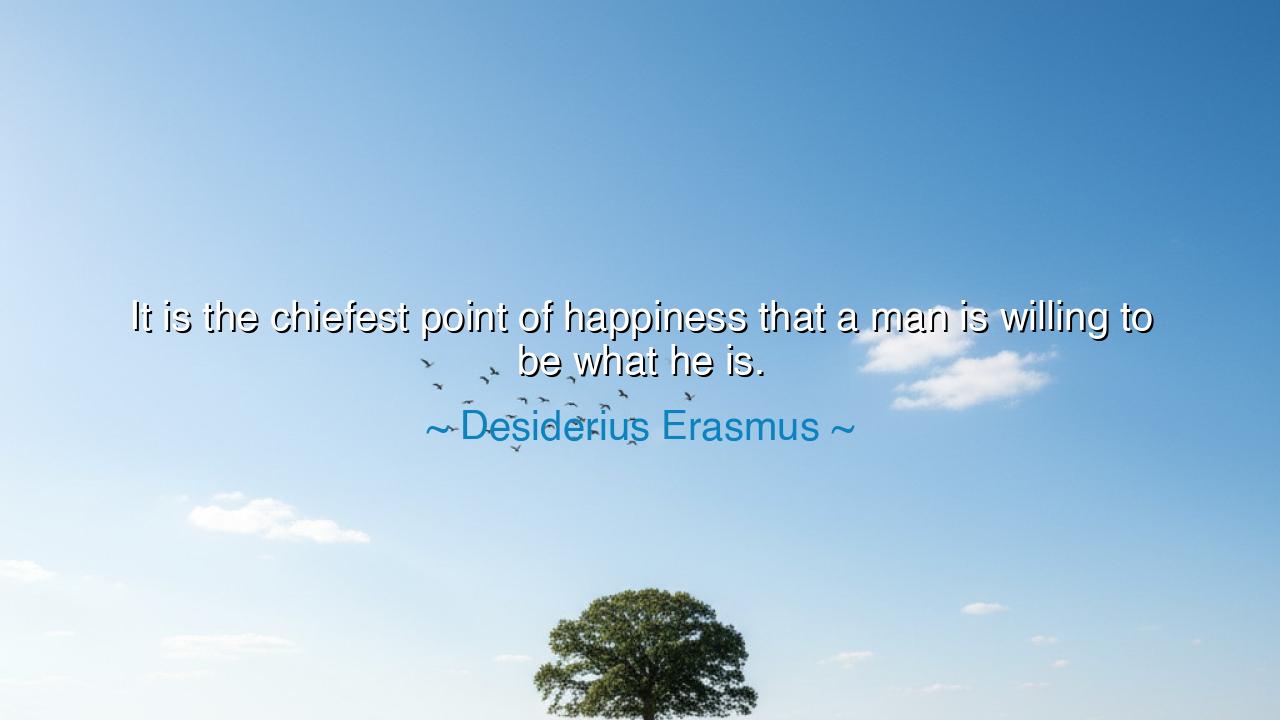
It is the chiefest point of happiness that a man is willing to be






Hear now the timeless wisdom of Desiderius Erasmus, the great scholar of the Renaissance, who once wrote: “It is the chiefest point of happiness that a man is willing to be what he is.” In this brief and shining utterance, he captures the essence of peace — that true happiness is born not from possession, nor ambition, nor the applause of men, but from the quiet acceptance of oneself. To be “willing to be what one is” — this is the rarest courage of all, for it means to cease the endless striving to become what the world demands, and instead to stand in the truth of one’s own nature.
Erasmus, born in the 15th century, lived in an age of turmoil — an era of reformation and revolution, where faith and reason clashed and men sought to remake the world. He himself was a man of intellect and wit, torn between the contemplative life and the public one. Yet through his writings, he came to see that peace does not come from changing one’s station or shape, but from harmony between the inner self and the outer life. His quote, drawn from his reflections on human folly and virtue, carries a profound insight: that the soul which accepts itself is like a tree rooted in calm soil, unshaken by the winds of comparison or pride.
To be willing to be what you are is not weakness or resignation; it is an act of power. For the world is filled with masks — with men who pretend to be strong when they are fearful, and with women who hide their wisdom lest it offend. But those who live in pretense live in exile from themselves. They chase approval but never find rest. The wise, however, turn inward and say: “This is who I am — imperfect, changing, but whole.” Such a one ceases to measure life by the shadows of others and begins instead to walk in the light of his own truth. That is the chiefest point of happiness, for the self no longer wars against itself.
Consider the life of Abraham Lincoln, who bore a heavy soul and the burden of doubt all his years. He was not the polished hero that history later made of him; he was awkward, melancholy, and often uncertain. Yet it was his acceptance of these very traits — his humility, his compassion, his slow and steady thought — that made him great. In being wholly himself, he found the strength to lead a broken nation toward unity. Had he tried to be anyone else — a louder man, a quicker man, a proud man — he would have faltered. His greatness was not in denying his nature, but in embracing it. So too must we learn that authenticity is the foundation of happiness and courage alike.
The ancients knew this truth as well. The oracle at Delphi proclaimed, “Know thyself,” and from that knowing, all wisdom flowed. For he who knows himself no longer wastes his strength fighting against his own soul. He no longer envies others, for he sees that every being is shaped for a unique purpose. The bird does not resent the fish for swimming; the mountain does not envy the sea. Each fulfills its own nature, and in that fulfillment lies harmony. So it is with the human heart. To live joyfully within one’s nature is to live in tune with the music of creation itself.
Yet this harmony demands humility. It means to accept not only one’s gifts but one’s limits — to see that imperfection, too, is sacred. The proud seek to be gods and end in misery; the wise rejoice in being human. For even the flaws of one’s character can become instruments of grace when accepted with awareness. The impatient man learns compassion through failure; the timid one learns courage through need. When we stop cursing our weaknesses and begin to learn from them, they cease to chain us. Erasmus teaches that to be content with one’s nature is not to surrender to it blindly, but to walk beside it as a friend, guiding it gently toward light.
So, my child, remember this: do not chase happiness in what you are not. Do not measure yourself by the lives of others, for every soul has its own rhythm and its own road. Look within and see yourself not as a flaw to be fixed, but as a work unfolding. Tend to your nature as a gardener tends his soil — with patience, with gratitude, with care. When you make peace with who you are, the storms of comparison lose their power, and joy begins to take root quietly within.
Thus spoke Desiderius Erasmus, whose wisdom still shines across the centuries. “It is the chiefest point of happiness that a man is willing to be what he is.” To be at peace with one’s own being — that is the greatest victory. To live without envy, to labor without disguise, to love without shame — that is the true art of life. Be willing, then, to be yourself — for in that willingness lies both freedom and happiness, the calm at the center of all striving, and the light by which the soul finds its way home.






AAdministratorAdministrator
Welcome, honored guests. Please leave a comment, we will respond soon